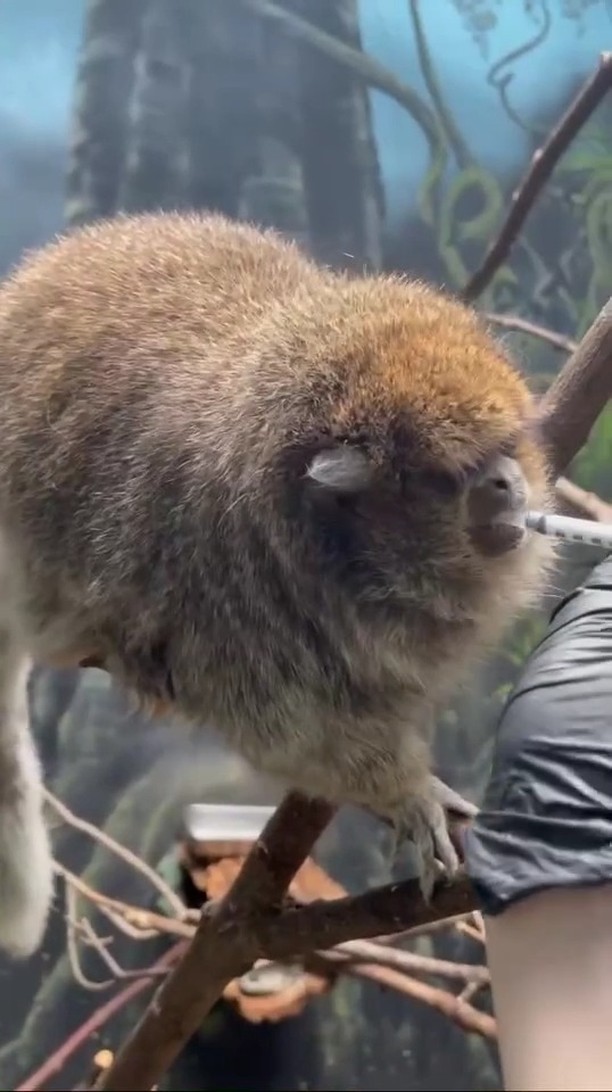- Importance of providing specialized care and attention to zoo animals
- Training techniques used for medication administration in zoo animals
- Building trust between keepers and animals
- Long-term benefits of positive reinforcement training
- Contributions to veterinary care and animal welfare
Providing specialized care and attention to our animals is a top priority. This strategy is vital in ensuring that zoo inhabitants receive the best possible care aligned with their unique needs. Titi monkeys, especially those with longstanding residency within a zoo, like our 20-year-old titi monkey, require judicious care practices to enhance their health and well-being. Over the years, we have adopted innovative methods to train her in taking her medication voluntarily, a crucial aspect of her daily care routine. This approach signifies the evolution of animal care, where the focus is on developing strong, trust-based relationships between keepers and animals.
Training Techniques for Medication Administration
Administering medication to animals without causing stress or discomfort is a challenge that zookeepers frequently encounter. For our 20-year-old titi monkey, keepers have employed positive reinforcement training to achieve this goal. Positive reinforcement involves rewarding the animal for desired behavior, making it more likely that the behavior will be repeated. This method is effective because it encourages voluntary participation from the animal.
In the video presented by Keeper Megan, we witness the culmination of years of training, where the titi monkey willingly takes her medication. This training not only aids in timely medication intake but also reduces the stress and anxiety associated with forceful administration. Techniques such as using favorite treats as rewards, creating a calm atmosphere, and establishing a consistent routine have been integral to this process.
Building Trust Between Keepers and Animals
Trust is the cornerstone of successful animal training and care. Establishing trust involves consistent, respectful, and patient interactions between keepers and animals. For our titi monkey, who has been under our care for 20 years, this trust-building process has been ongoing since she arrived at the zoo. Keeper Megan’s video exemplifies the level of trust achieved through daily positive interactions.
Trust-building begins with the keeper’s understanding of the animal’s behavior and needs. Keepers spend extensive time observing and interacting with the animal, learning its preferences and triggers. In turn, the animal begins to associate the keeper with positive experiences, which is critical for tasks such as medication administration. The trust between our titi monkey and her keepers not only facilitates her medical care but also enhances her overall quality of life within the captive environment.
Long-Term Benefits of Positive Reinforcement Training
Positive reinforcement training extends beyond immediate tasks like medication administration. Its long-term benefits are manifold, encompassing both the animal’s physical and psychological well-being. Animals trained using positive reinforcement display reduced stress levels, increased cooperation with keepers, and greater willingness to engage in enrichment activities.
For instance, our titi monkey participates in various health checks and routine examinations without exhibiting signs of distress. This cooperative behavior stems from the positive experiences associated with her training. Additionally, such training practices contribute to the animal’s mental stimulation, promoting cognitive health and reducing the likelihood of stereotypic behaviors often seen in captive animals.
Contributions to Veterinary Care and Animal Welfare
The practices adopted for our titi monkey highlight the broader contributions of specialized care and attention in zoological settings. Effective animal care requires a collaborative effort between keepers, veterinary staff, and animal behaviorists. The ability of keepers to administer medication voluntarily ensures that animals receive timely and consistent medical treatment, which is essential for managing chronic conditions and preventing illnesses.
Moreover, the emphasis on trust and positive reinforcement aligns with modern animal welfare standards, which prioritize the psychological well-being of animals in captivity. This approach not only enhances the health and longevity of the animals but also reflects a commitment to ethical and humane treatment.
In conclusion, providing specialized care and attention to zoo animals is an intricate and essential aspect of zookeeping. The training techniques used for our 20-year-old titi monkey to take her medication voluntarily exemplify the progress and dedication within the field. Building trust, employing positive reinforcement, and prioritizing animal welfare collectively contribute to the optimal care of zoo inhabitants. Such practices serve as a testament to the evolving standards of animal care, where the focus is on creating a harmonious and nurturing environment for all zoo residents.
*****
Source Description
Providing specialized care and attention to our animals is a top priority. Over the years, we have trained our 20-year old titi monkey to take her medication voluntarily from keepers. According to Keeper Megan, this video is an example of how keepers have built an enduring trust with the animals to ensure they are able to provide optimal veterinary care.
🎥: Keeper Megan


